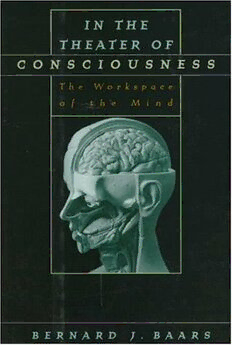
In the Theater of Consciousness: The Workspace of the Mind PDF
210 Pages·1997·10.409 MB·English
Most books are stored in the elastic cloud where traffic is expensive. For this reason, we have a limit on daily download.
Preview In the Theater of Consciousness: The Workspace of the Mind
Description:
The study of conscious experience has seen remarkable strides in the last ten years, reflecting important technological breakthroughs and the enormous efforts of researchers in disciplines as varied as neuroscience, cognitive science, and philosophy. Although still embroiled in debate, scientists are now beginning to find common ground in their understanding of consciousness, which may pave the way for a unified explanation of how and why we experience and understand the world around us. Written by eminent psychologist Bernard J. Baars, In the Theater of Consciousness: The Workspace of the Mind brings us to the frontlines of this exciting discipline, offering the general reader a fascinating overview of how top scientists currently understand the processes underlying conscious experience. Combining psychology with brain science, Baars brilliantly brings his subject to life with a metaphor that has been used to understand consciousness since the time of Aristotle--the mind as theater. Here consciousness is seen as a "stage" on which our sensations, perceptions, thoughts, and feelings play to a vast, silent audience (the immensely complicated inner-workings of the brain's unconscious processes). Behind the scenes, silent context operators shape conscious experience; they include implicit expectations, self systems, and scene setters. Using this framework, Baars presents compelling evidence that human consciousness rides on top of biologically ancient mechanisms. In humans it manifests itself in inner speech, imagery, perception, and voluntary control of thought and action. Topics like hypnosis, absorbed states of mind, adaptation to trauma, and the human propensity to project expectations on uncertainty, all fit into the expanded theater metaphor. As Baars explores our present understanding of the mind, he takes us to the top laboratories around the world, where we witness some of the field's most exciting breakthroughs and discoveries. (For instance, Baars recounts one extraordinary sequence of experiments, in which state-of-the-art PET scans--reproduced here in full color--capture in fascinating, graphic detail how brain activity changes as people learn how to play the computer game Tetris.) And throughout the book, Baars has sprinkled numerous and often highly amusing on-the-spot demonstrations that illuminate the ideas under discussion. Understanding consciousness is perhaps the most difficult puzzle facing the sciences today. In the Theater of Consciousness offers an invaluable introduction to the field, brilliantly weaving together the various theories that have emerged as scientists continue their quest to uncover the profound mysteries of the mind--and of human nature itself.
See more
The list of books you might like
Most books are stored in the elastic cloud where traffic is expensive. For this reason, we have a limit on daily download.
